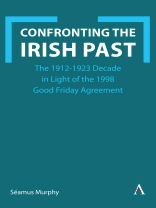The 1998 Belfast (Good Friday) Agreement established power-sharing arrangements between the two divided communities in Northern Ireland. The Agreement is not set in stone but is rather a hopeful yet uncertain project. Making it put down deep cultural roots requires some confrontation with and transformation of the history, and the socially constructed memories, of Ireland’s decisive decade 1912–1923, which was violent and divisive.
Table of Content
Acknowledgements; Chronology; Abbreviations and other Names; 1. Introduction; 2. Historians: Objectivity and Value; 3. L’homme Armé: Three Civil Conflicts; 4. Policy and Governance; 5. The Ethics of Social Memory; 6. Identity, Recognition, Politics; References; Index
About the author
Séamus Murphy is professor of philosophy at Loyola University Chicago. He writes on philosophy and public policy. He is a Jesuit.












